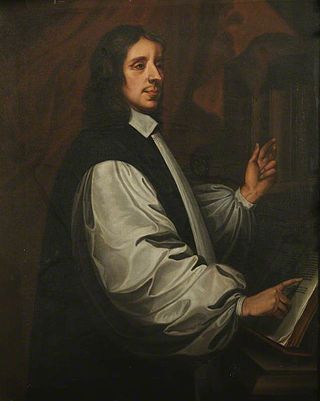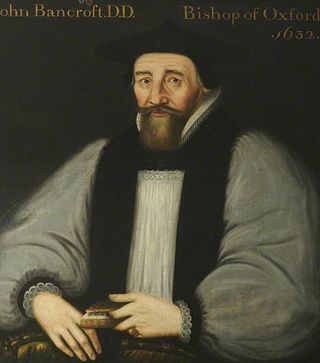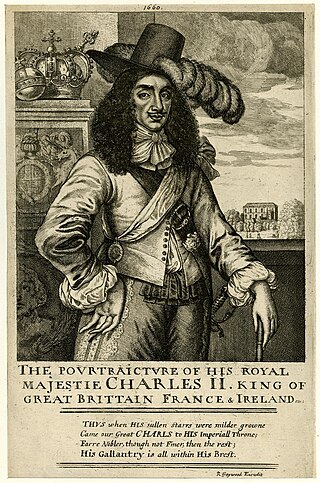Related Research Articles

John Milton was an English poet, polemicist, and civil servant. His 1667 epic poem Paradise Lost, written in blank verse and including twelve books, was written in a time of immense religious flux and political upheaval. It addressed the fall of man, including the temptation of Adam and Eve by the fallen angel Satan and God's expulsion of them from the Garden of Eden. Paradise Lost elevated Milton's reputation as one of history's greatest poets. He also served as a civil servant for the Commonwealth of England under its Council of State and later under Oliver Cromwell.

The Stuart Restoration was the reinstatement in May 1660 of the Stuart monarchy in England, Scotland, and Ireland. It replaced the Commonwealth of England, established in January 1649 after the execution of Charles I, with his son Charles II.

William Juxon was an English churchman, Bishop of London from 1633 to 1646 and Archbishop of Canterbury from 1660 until his death.

John Fell was an English churchman and influential academic. He served as Dean of Christ Church, Oxford, and later concomitantly as Bishop of Oxford.

Richard Allestree or Allestry was an English Royalist churchman and provost of Eton College from 1665.

Obadiah Walker was an English academic and Master of University College, Oxford, from 1676 to 1688.

The Wars of the Three Kingdoms were a series of conflicts fought between 1639 and 1653 in the kingdoms of England, Scotland and Ireland, then separate entities in a personal union under Charles I. They include the 1639 to 1640 Bishops' Wars, the First and Second English Civil Wars, the Irish Confederate Wars, the Cromwellian conquest of Ireland and the Anglo-Scottish War of 1650–1652. They resulted in the execution of Charles I, the abolition of monarchy, and founding of the Commonwealth of England, a unitary state which controlled the British Isles until the Stuart Restoration in 1660.
Jonathan Charles Douglas Clark is a British historian of both British and American history. He received his undergraduate degree at Downing College, Cambridge. Having previously held posts at Peterhouse, Cambridge and All Souls College, Oxford into 1996, he has since held the Joyce C. and Elizabeth Ann Hall Distinguished Professorship of British History at the University of Kansas.

Sir Thomas Chicheley of Wimpole Hall, Cambridgeshire was a politician in England in the seventeenth century who fell from favour in the reign of James II. His name is sometimes spelt as Chichele.

Edward Backwell was an English goldsmith-banker, and politician who sat in the House of Commons at various times between 1673 and 1683. He has been called "the principal founder of the banking system in England", and "far and away the best documented banker of his time".
Events from the year 1660 in England. This is the year of the Stuart Restoration.
Thomas Walker was an Oxford academic and administrator. He was twice Master of University College, Oxford.
Joshua Hoyle was a Professor of Divinity at Trinity College Dublin and Master of University College, Oxford during the Commonwealth of England.

John Bancroft was an English clergyman and academic, who served as Bishop of Oxford and Master of University College, Oxford.

The Restoration of the Monarchy of Ireland began in 1660. The Commonwealth of England, Scotland and Ireland (1649–1660) resulted from the Wars of the Three Kingdoms but collapsed in 1659. Politicians such as General Monck tried to ensure a peaceful transition of government from the "Commonwealth" republic back to monarchy. From 1 May 1660 the English, Scottish and Irish monarchies were all restored under King Charles II. The term Restoration may apply both to the actual event by which the monarchy was restored, and to the period immediately before and after the event.

The Restoration was the return of the monarchy to Scotland in 1660 after the period of the Commonwealth, and the subsequent three decades of Scottish history until the Revolution and Convention of Estates of 1689. It was part of a wider Restoration in the British Isles that included the return of the Stuart dynasty to the thrones of England and Ireland in the person of Charles II.

John Cook or Cooke was the first Solicitor General of the English Commonwealth and led the prosecution of Charles I. Following The Restoration, Cook was convicted of regicide and hanged, drawn and quartered on 16 October 1660.
Joshua Childrey (1623–1670) was an English churchman and academic, antiquary and astrologer, the archdeacon of Salisbury from 1664. He was a "country virtuoso", and an avowed Baconian. He also has been considered a dilettante.
John Durel (1625–1683), John Durell, or Jean Durel, was a cleric from Jersey, known for his apologetical writing on behalf of the Church of England. He became Dean of Windsor in 1677. His French translation of the 1662 Book of Common Prayer was used frequently on the Channel Islands through to the 20th century and his 1670 Latin translation had been authorized by Convocation.
References
- ↑ Carr, William, University College , Routledge, 1998. ISBN 978-0-415-18632-2. Chapter VI, The Seventeenth Century to the Restoration, 1660'.
- ↑ Darwall-Smith, Robin, A History of University College, Oxford. Oxford University Press, 2008. ISBN 978-0-19-928429-0. Pages 178–181.